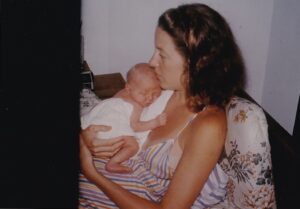 I knew nothing about circumcision until I was planning to have a baby back in 1983. I was 31 years old, living in New Haven, Connecticut, and married to a Jewish man.
I knew nothing about circumcision until I was planning to have a baby back in 1983. I was 31 years old, living in New Haven, Connecticut, and married to a Jewish man.
My husband, Richard, and I knew right away we wanted a home birth, and fortunately we found two independent midwives along with five other local women planning to have home births with them. We also met with an ob-gyn doctor who was willing to back up the home birth if the mother needed to be taken to the hospital. I felt so supported as I faced birthing a baby.
As the days and months went by, a strong and nurturing relationship began to grow among the women planning a home birth. We all thought a lot about birthing and how to do it with the least amount of trauma to the mother and the infant. We shared what we knew about the care of the infant and breastfeeding. We gave our collective a name: Round Belly. We agreed to take pictures of our birthing days and share them with each other.
During this time I began a program for childbirth education with Informed Home Birth by Rahima Baldwin. It was then I became fully aware of the procedure of circumcision. I not only read about it, I saw photos of the infant strapped down or held down, without anesthesia (other than wine or sugar water and maybe some lidocaine). The foreskin of the penis is pulled from its attachment and cut and removed. The infant screams and, without a doubt, is in severe pain.
I turned into a mother animal and could not find any reason to allow this to happen to my baby if I had a boy. I could see with my own eyes that this was trauma, big trauma! I knew I had to convince my Jewish husband that this was wrong. He grew up in a faith that spiritualizes circumcision and performs it as a religious ceremony.
The answer came one day in a Jewish delicatessen, where Richard and I were having lunch. As we were leaving, we noticed a large framed poster advertisement for Manischewitz wine on the wall. The occasion was a bris. Men in the photo were raising their glasses of wine in joyous celebration of the ceremony. The baby, on the other hand, was screaming, with a beet red face, his mouth wide open and eyes closed tight. His hands were in tight little fists. We stared at this image for several moments. I was happy and relieved when Richard turned to me and said that it doesn’t make sense anymore to do this to an infant. He said he would stand by me to leave our baby’s genitals alone.

One by one, the babies in our group were being born at home, and by the third baby—all boys—there were no circumcisions. I was fourth and on July 23, as the sun was rising, I birthed a baby boy. We did not have him circumcised. The last two births were also at home—two more boys, left whole.
Round Belly continued to meet for years afterward along with our sons, and at times with just the mothers, sharing our collective wisdom and swapping stories. That early support of like-minded women was like gold. Most American doctors insist circumcision is necessary for hygiene and as a preventive procedure for health reasons.
Millions of parents around the world will tell you that’s not true. Thoughtful hygiene for the genital area, be it with a boy or a girl, is important and sufficient. Frequent diaper changes, warm baths and airing out are the groundwork.
I became aware of Intact America in 2010 and knew I had to add my support. My heart is filled with gratitude for the work of Intact America and for the perseverance of Georganne Chapin. She is an Amazon warrior as she stands up for the rights of our baby boys. I hope with all my heart that society will increasingly question the practice of routine circumcision and that fewer and fewer people will choose to allow this painful cut to such a delicate part of a baby’s precious little body. As a preventive medical procedure performed on infants, circumcision has no place. And as for religious traditions, these do change over time. Many Jews are not circumcising their sons and are, instead, marking their infant boys’ covenant with God in a peaceful and non-harming way, so that they can mature into peaceful men.




